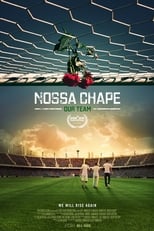Tag: Brazil
-

Review: ‘An Invisible Victim – The Eliza Samudio Case’ (2024)
Categorized as a True Crime film, the Brazilian documentary A Vítima Invisível: O Caso Eliza Samúdio is really more of a tragedy. A story like this makes me wonder if victims will ever receive justice. Or will celebrities always be able to get away with their crimes, even murder?
-

‘Pelé’ (2021) – the game that made Pelé cry
The Netflix documentary Pelé has all the makings of a prestige film: a man known as the greatest footballer in the world, the only player to have won 3 World Cups, and celebrity in the historical context of a brutal dictatorship. The twist in the story is that you see an aged man at his…
-

‘Meninos de Kichute’ (2010) an engaging look back at Brazilian life
I watched Meninos de Kichute on TubiTV and was surprised to find such a well-crafted film that I had never heard of. Set in 1975, the story shows life in a small Brazilian city, where for men a status car is a Dodge Dart or a Karmann Ghia, and for boys, it is a pair of…
-

‘Democracia em Preto e Branco’ (2014) politics football and rock ‘n roll
What foments political change? What makes a people realize they deserve a say in how their lives are run? This documentary convinces us the answer is combining politics with football and rock ’n roll.
-

Review: ‘Barbosa, the Man Who Made Brazil Cry’ (2014)
Barbosa, the Man Who Made Brazil Cry revisits the trauma bestowed upon goalkeeper Barbosa, who is often blamed for Brazil’s loss to Uruguay in the Final of World Cup 1950 at the Maracana stadium. This match is famously known as the disastrous El Maracanazo.
-

ESPN explores ‘The Myth of Garrincha’ (2014)
The Myth of Garrincha is a 22 minute episode in ESPN’s 30 for 30 Soccer Stories, currently available on ESPN+. Garrincha was Pelé’s peer, and as long as they were on the field together, Brazil never lost a World Cup.
-

‘StreetKids United 2: The Girls of Rio’ (2015) raises awareness
Last month, I reviewed Zebras, a low-budget documentary which followed the Argentine boys team that competed in the 2014 Street Kids World Cup in Brazil. StreetKids United 2: The Girls of Rio is a slicker production by Director Maria Clara, following a team of girls from Rio who compete in the same tournament.
-

Soccer transforms homelessness in ‘Zebras’ (2016)
While the title Zebras may confuse you, this documentary is about 9 Argentine boys who represent their country in the Apr-2014 Street Child World Cup in Rio de Janeiro. The boys live together in La Casita, a home that takes children off the streets of Buenos Aires. By participating in the tournament, the boys experience…
-

‘Kaiser’ (2018) perpetuates a lad’s fantasy
Imagine you’re at WC 2014 in Brazil, and you hear this great story about a legendary local lothario. Known as Kaiser, Carlos Henrique Raposo pretended to be a pro footballer and lived the life for over 20 years. He slept with thousands of women, conning the ladies, owners, and coaches, while cleverly avoiding ever getting…
-

‘Forever Chape’ (2018): a third view of the Chapecoense disaster
Para Sempre Chape is the third film I have seen on the Nov-26-2016 tragic flight of the Brazilian team Chapecoense. This version by Uruguayan Director Luis Ara intended to showcase the team’s history and recovery, but not focus on the grim details of the accident. To read the details of the tragedy, please refer to…
-

‘Setenta y Sete’ (2017): a fine piece of reporting
Setenta y Sete is an ESPN TV documentary on the Nov-2016 plane crash that killed 71 of 77 passengers and staff traveling with the Brazilian Chapecoense team to Medellin, Colombia. The E:60 segment was originally broadcast in Jun-2017, but it was slightly updated and re-broadcast during WC 2018. I assume the update was meant to…
-

‘Nossa Chape’ (2018) a view inside the club
Nossa Chape is the Zimbalist Brothers’ film on the greatest sports tragedy of the 21st Century. The documentary covers the crash of the charter flight that carried the Brazilian Chapecoense team to Medellin, Colombia, and the struggle of the club and the survivors to rebuild. The film arrived on the Fox Sports channel in time…
-

‘Jules and Dolores’ (2016) – a classic dumb criminal movie
O Roubo da Taça, which literally translates as “Theft of the Cup”, could have been a who-done-it about the heist of Brazil’s Jules Rimet trophy in 1983. Instead, Writer-Director Caito Ortiz made the story into a how-dumb-it comedy. You are constantly asking yourself, how dumb can these two guys be?
-

More FIFA corruption in ‘The March of the White Elephants’ (2015)
In The March of the White Elephants, Director Craig Tanner continues the work he began with his first film, exposing the societal insanity of spending billions on stadiums for a one month soccer party.
-

Romanian corruption in ‘Craiova versus Craiova’ (2016)
What is the most extraordinary aspect of the documentary Craiova versus Craiova? It’s not that 2 teams claimed to be the same club and then played each other in the Romanian Second Division. What’s amazing is that this excellent film was created by a student as his senior journalism project at a Brazilian university. Director…
-

The frenzy of favela futebol in ‘Campo de Jogo’ (2014)
Campo de Jogo (Sunday Ball) is a kinematic metaphor for Brazilian soccer. Director Eryk Rocha lays bare the intense emotions of favela futebol. He assembles a film that is both documentary and cinematic art. It was shown at New York’s MOMA and is similar to, but much better than, the 2006 art piece on Zidane.
-

‘This is Not a Ball’ (2014) shows the process of artist Vik Muniz
The documentary This is Not a Ball was made in anticipation of the 2014 World Cup, but it is not really a soccer movie and instead captures the creative process of the Brazilian artist Vik Muniz.
-

Ideal soccer date movie: ‘Romeo and Juliet get Married’ (2005)
A few years after making Bossa Nova, Bruno Barreto directed this Brazilian comedy, O Casamento de Romeu e Julieta, which is another, even better, soccer date movie.
-

Review: ‘The Year My Parents Went on Vacation’ (2006)
In the touching drama, The Year My Parents Went on Vacation, 1970 is the year of the triumph of Pelé and one of Brazil’s greatest teams. But “on vacation” is an activist euphemism for going on the lam to avoid arrest and torture by Brazil’s ruling military dictatorship.

